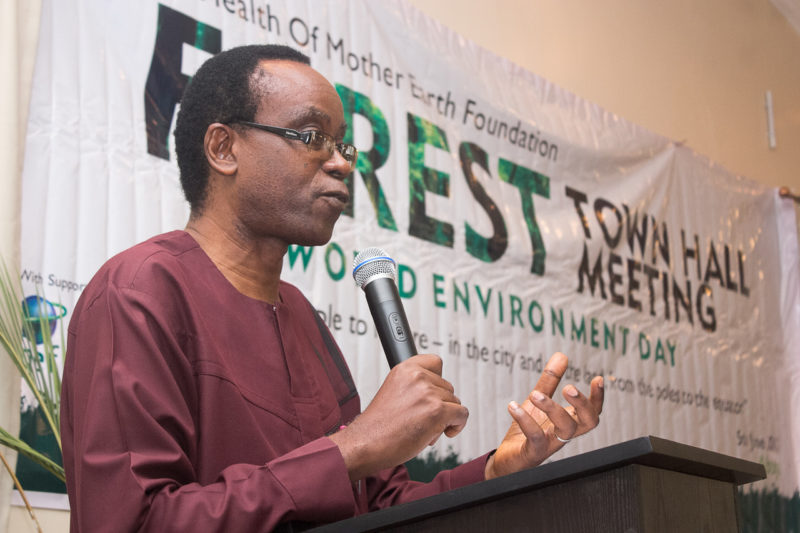Nnimmo Bassey, director, Health of Mother Earth Foundation (HOMEF), in a presentation at the Farmers’ Dialogue themed: “Promoting Biosafety in Nigeria” held in Benin City, Edo State, on Friday, September 21, 2018, stresses that, because small-scale farmers feed the world, they matter and must be listened to

Farmers feed the world. This is an incontrovertible fact. Small scale or family farmers feed the world. This is another incontrovertible fact. This second fact is unfortunately often overlooked. The willful rejection of the truth that small-scale farmers feed the world has persisted because accepting the truth would compel policy makers to refocus attention where it matters rather than pumping resources into industrial farming that create ecological and social economic problems and is vastly inefficient when outputs are compared to inputs. We say this because small scale farmers use 30% of arable land and resources and feed 70% of the population while the exact reverse is the case with industrial farming.
Scare tactics of ever-growing population has been used as an excuse to force the diversion of public funds into private industrial agriculture as well as the introduction of genetically engineered crops into Africa and other parts of the world. Again, the fact that the world currently produces enough food to feed almost double the current population is ignored in the conversations.
For Nigeria, our country, we are told that we will have the third largest population by 2050, surpassing the United States of America (USA) among others. In fact, the United Nations projects that the population growth rate in Africa will “at least double” by 2050. Lineal population growth may be possible if African countries do not improve on social indices and if disease, poverty and illiteracy persist. It is time to re-examine the statistical basis of Nigeria’s population otherwise the shame will be on us when we become the most populous nation on earth and the people cannot be found!
Another fact that begs for acceptance is that people are not hungry because there is no food in the world. About 30 percent of food goes to waste. In addition, industrial farming thrives on monocultures and is the major supplier of feedstock, as expected, for industrial processes. The assertion that people are not hungry due to lack of food in the market is also buttressed that most of the people that go to bed hungry are actually farmers. This happens because farmers have to sell their produce so as to meet family needs – such as housing, medicals, transportation and school needs of their children.
Farmer to farmer exchanges are vital for the sharing of ideas, farming practices and ways for preserving seeds and our overall biodiversity. Meeting to have dialogues between farmers provides a platform to diagnose the challenges facing small holder farmers as they struggle to meet the food requirements of the population.
Dialogue spaces also provide platforms for examining the quality of seeds available to farmers and the special threats posed by opening of the flood gates to genetically engineered crops into Nigeria.
We continue to demand for a radical revision of the National Biosafety Management Agency (NBMA) Act 2015 and the installation of a neutral Biosafety Regulatory Agency that is totally different from the extremely pro-GMO one currently in place. In fact, today it is hard to distinguish NBMA from National Biotechnology Development Agency (NABDA) – an agency expressly set up to promote GMOs even before any biosafety law was in place in the country. We are experts at putting the truck ahead of the truck pusher and once on the wrong path we stubbornly refuse to step back, except in rare cases like that of our Nigeria Air.
Today, respectable research institutions have bought into the GMO train making it difficult for farmers to know when they are being sold genetically modified cassava, beans or maize. Even if farmers were to know that they are being sold suspect seeds, once the seeds get into the food market, consumers have no way of knowing what is being sold to them. There is no way anyone will label akara, moi moi, ogi, eba or similar foods made from genetically modified seeds. In other words, Nigerians are on the wrong bus already.
Concerned medical doctors and religious bodies and consumer groups have expressed reservations over the pollution of our seeds and foods. The agencies responsible continue to push on in utter contempt of these concerns.
We will proceed to dissect, debate and consider the risks to our health and biodiversity, not just for our sake but for the sake of generations yet unborn. We are concerned that unproven assertions are presented as truths by GMO promoting agencies in total disregard of the globally increasing call for ban of cancer-causing herbicides that are already in our markets and will be more extensively used in the cultivation of crops genetically modified to withstand them.
Today we assure our farmers that you have strong allies in the GMO-Free Nigeria Alliance and that the struggle to ensure that technofixes are not presented as cure-all in our agricultural sector. We will stand with you and demand justice for us all. Together we will demand rural infrastructure, storage and processing facilities for farm produce as well as provision of extension officers to share knowledge on agroecological methods of agriculture that is in line with our practices developed over the millennia and is not tied to the apron strings of institutions that are patently neocolonial and unpatriotic.
Farmers do matter and must be listened to.
